Latest Contributions
Read More Contributions
Chapter 10: Moving away from the in-laws’s home
Category:
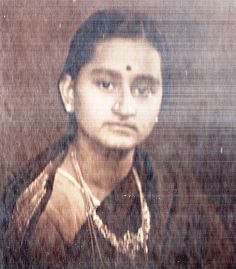
Visalam Balasubramanian was born in Pollachi, on May 17, 1925. She was the second of three children. Having lost her mother at about age 2, she grew up with her siblings, cared for by her father who lived out his life as a widower in Erode. She was married in 1939. Her adult life revolved entirely around her husband and four children. She was a gifted vocalist in the Carnatic tradition, and very well read. Visalam passed away on February 20, 2005.
Editor's note: This is Part 10 of her memoirs, which have been edited for this website. Kamakshi Balasubramanian, her daughter, has added some parenthetical explanatory notes in italics.
Part 1 Part 2 Part 3 Part 4 Part 5 Part 6 Part 7 Part 8 Part 9
I am once again beginning to write my memoirs from where I had left off last year (This is dated "16-1-1994"-KB). I hope I will do justice to the task. I do want to be truthful and I am sure there is no difficulty in doing that. When I say 'doing justice,' I mean I hope I remember all the important people in my life, their role, contributions, etc.
Soon after I got married, I began to live with my parents-in-law in Tirukkarugavur. Although my father-in-law used to say that not teaching one's child the rudimentary things in life is a positive disservice and not indulgence, he could not put it into practice in my case, owing largely to my mother-in-law's disinclination and non-cooperation. Several times he put across the idea that I should be trained in cooking and kitchen management. He once even sent away the cook for a period of three months so that I will be necessarily put in the kitchen to do some work. But my mother-in-law never allowed me or Parvatham (Visalam's older sister-in-law\; women in such a married relationship as daughters-in-law are often referred to as co-sisters-in-law in India) to do anything beyond washing the stone vessels (called karchatti in Tamil) because they were not to be touched by non-Brahmins. (In most middle class households there were (and still are) servants who 'wash vessels,' i.e., do dishes. These servants are rarely Brahmins. Hence, the reference to certain kinds of vessels and how they couldn't be washed by non-Brahmins-KB)
My father-in-law then went to the extent of insisting that Parvatham and I begin the day with the preparation of early morning coffee, and go on to cutting vegetables and not leave the kitchen until we ate our lunch, and clean up. My mother-in-law found objections in numerous ways. My father-in-law one day shouted at her saying, "You are determined to look upon them only as daughters-in-law. You don't mean to make them feel at home here. And in turn you will only be a mother-in-law in their eyes."
He left it at that. He did feel (realise to put it correctly) that I was ill equipped to run a household but he could not do much.
I was also aware of my deficiencies, utter lack of practical sense and the need to learn for my own good. It was there that the clash of ideas between my parents' house and my father-in-law's house stood out prominently. My father always said that I was excellent in everything and mere cooking alone had not been taught. Kandappan (a fond household servant at Visalam's childhood home, described in earlier sections - KB) also endorsed it wholeheartedly. My father always said, "It's just training in cooking that's lacking. Big deal. It is easy enough to pick up." Or, "They humiliate you because you can't cook. Don't be deceived. You know a lot more than they recognise," etc.
Kandappan also would say, "You are trained in such a lot of things. What's cooking?"
In their eyes I was young, and with growing up I would just pick up the necessary home-making skills! The praise from my father and Kandappan went to my head easily, whereas when my father-in-law pointed out the necessity for me to learn to do everything, I thought he was trying to mould me. Or, unmould me from being what I was! In addition to my father and Kandappan, my sister Gowri used to say that cooking didn't need any skill.
Thus, the four years - 1939 to 1942 - were just a waste of time. My father-in-law wanted that I should sing for an hour at least every evening and Kalpakam play on the veena, a classical musical instrument much in favour in southern India. That, too, was frowned upon by my mother-in-law and her mother. They took us aside and made us give excuses to my father-in-law.
To think that such precious time, between the ages of 14 and 18 years, should be idled away on the one hand, on the other hand, oppression, recriminations and a sense of being wronged developing steadily! Well, all that is past. Many lives are wasted in this world in many ways. So let me not think of the follies that happened.
The long and short of the first few years with my in-laws is, I shied away from learning to do housework. Whenever I happened to spend time with any of my sisters-in-law or brother-in-law during that period, I would own up what I didn't know, and they would teach me. Whereas, if my mother-in-law also happened to be present there, then she would tease me with words and gesture, making it embarrassing or impossible for me to learn and them to teach.
***
Well. Late in the year 1942 I came to live with my husband who was by then a junior officer in the employ of the Government of India, under the British. Gowri, my eldest sister-in-law, had been in Tirukkarugavur since late 1941, away from the city of Madras, owing to evacuation of all civilians from cities and big towns, especially port cities. This was the time of World War II. Japan was advancing fast into Burma and even Arakan in India.
By the middle of 1942, the position had eased a little and people were returning to the cities. Schools and colleges were beginning to work in the metropolis. So Gowri's husband, Raghavan, took up a big house in Madras (now Chennai) to accommodate both their family, and me and my husband. My father-in-law had just recovered from a severe and protracted bout of pleurisy/lung abscess. And he would be better off in the city with all of us around, than by himself in the village. This arrangement made sense, as a very senior doctor - a surgeon - who had lived in close proximity to my father-in-law and family during their mutual early days in service was in Madras.
My father-in-law provided me with a cook. My sister-in-law had her first child, a daughter, a little late. I do not know what the problems with her health were. In those days, they may not have thought of those as problems arising from incompatibility of blood grouping nor would they have done any other studies as they do now. The matter was, till this girl was born when my sister-in-law was thirty or thirty-one, she never carried her pregnancy beyond the first few months. She had three children in all. The first and third were slightly slow in intelligence, not robust in constitution, though well built. The middle one - a boy - was normal.
My sister-in-law must have been a very, very practical person. She never gave any special treatment to this boy, her middle child. Never made him feel that he was superior to his sister and brother in intelligence. She was equally attentive to the needs of all her children and those who were under her care, and concerned about them. No preferences, no reticence. She invariably had young children, adolescent ones of her relatives from her own side of the family as well as that of her husband's to look after at various times. At times, some grown up, married couples and families also took up residence with her for extended periods.
I have a poignant memory of the time when her fourth sister's daughter was with her for a few years. She was a shy, silent, and stubborn girl but very affectionate. She was also timid. She was two years younger to my first sister-in-law's dull-witted daughter. Both of them used to go to school together.
It could have been a problem in any other family to have two good-looking little girls, one impossibly dull and ignorant, and the other quite normal. But in my sister-in-law's able handling there simply never was a problem. Not one of them being late for school, no comments emanating from any neighbour, no room for any invidious comparisons. She catered to everyone's nature. My sister-in-law had a fine sense of beauty and appreciation of artistic things.
In fact, the three elder sisters-in-law always had a host of relatives staying in their homes. Circumstances and conditions were definitely different in each one's case. But, each one of them was hospitable, cheerful and helpful. I have spent lots of time with my eldest sister-in-law at Madras, and the third one at Sivaganga.
Now, after all these years, I am sorry to say, I never learned the practical wisdom with which they managed their family and home and the compassion and understanding they showed to some of the dependent relatives who stayed with them. Looking back, I see only the follies, blind foolishness and a very superficial awareness in me those days. All the opportunities that came my way, the talents I had were simply wasted because I did not know any better.
***
There is one thing I have enjoyed most. That is being a mother, though I can barely say I did any justice to that unique position. God blessed me with lovely children. I have always but always wondered what I did to deserve such children. I have even sought some inner advice from God to know that and ensure that I have such good ones in my future lives also.
I always end up saying to myself that God gave me many, many good things. I never asked for them. I wouldn't have known what would be good and when. God, in His infinite kindness, chose for me good things. So, He will take care of me. He will direct that I do something sometime to wipe away my sins, sinful thoughts, omissions and failures to do the right thing and salvage me.
Let me go back to what I began to say. My joy in being a mother. I must say that I felt a sense of possession, of holding something that was my own, something that was part of me because the baby grew inside me. I was responsible for the whole formation. At that age it did not occur to me at all that it was God's creation\; God's hands fashioning a child inside me. The baby's dependence on me for food filled me with pride. All this was only when Savithri (Visalam's firstborn, a girl-KB) was born. Soon, I outgrew this childish phase.

Visalam's husband, "TVB", with first daughter, Savithri. 1946?
Both Savithri and Ramesh (Visalam's second child, a boy - KB) were born in Erode, in my father's house. Gowri also happened to be in Erode during those days. A year before Savithri was born, Gowri had had her first son, Jayaraman. Sriram was born a year later. Her third child and my (only son) second child were born within a space of one week. There were a number of people to help out when we were in my father's home. Bathing the children, putting them to bed were done by the two cooks - Parvathy mami (a long-time, loyal cook in Visalam's maternal home, described in earlier sections-KB) and her sister. Mostly my father gave the children all their meals. Sterilising the feeding bottles was also Parvathy mami's job. So, only nursing the youngest could be called as the work we two were doing.
Gowri and I breastfed all our children. My daughters also nursed their babies. Complementary or additional milk or cereals were started only after they were three months old. My father assembled much paraphernalia for the babies: viz. mosquito nets, closed enamel buckets for soiled clothes, new baby clothes, sheets, water-proof material in different sizes intended for use in bed, while holding the baby on the lap, etc. etc.
***
My husband was reluctant to be away from me and the children. So, whenever he got transferred (Visalam's husband was in the Government service, and it was the policy then to move employees from one location to another regularly\; this policy continues to be in effect in India-KB) and moved from one place to another, he would fix up a house within a span of a week. He would arrange to take us to his place very quickly after that. In the earlier years, he was working in the Madras Circle and any city that he moved to would be within a few hours of journey from Erode.
Whether it was Erode or Tirukkarugavur, where I would be with my children during the transition period (i.e., between transfers), TVB (This was the name by which Visalam always referred to her husband-KB) always took us to the new place of his work within a week.
His love and concern for us could only be seen by his behaviour and actions. He never professed love or other sentiments in letters. In speaking also one would find him "matter-of-fact." But deep down in reality he is very steadfast, committed to the core and extremely affectionate. He always fixed up good, reliable servants well in advance of my joining him.
Actually, I have always had the best of domestic help. TVB is very generous and kind. I have not known him to scold anyone. I have never heard him use foul words, vulgar, obscene expressions or even slightly bad language. As a matter of fact, none in his family - brother, sisters, brothers-in-law, ever used any word that could be called bad or objectionable. All of them were uniformly kind to people who worked for them or worked with them.
It is again unfortunate that I failed to see all these wonderful points and traits until recently. It was partly because my father thought TVB was possessive like his father\; consequently, my father believed TVB also disliked our spending any length of time at Erode. And, my father-in-law's intrusion into our lives was also a factor. True. It was his son and his grandchildren for my father-in-law. Grandchildren are precious. Of course, I did see and know it. He had even accepted me in a way. But, his thinking and ways and my viewpoint were divergent. Anyway, as long as both my father and his father lived, TVB and I did not have a real harmonious life.
With all the affection, love, dependence and the binding, we had our own impediments to our happiness. TVB had his ego and authority. I was completely leaning on my father for support. Mental and spiritual.
Here, I must say, the actual management of the house, children etc., was taken care of by TVB. That was the way in his family. Household expenses were controlled by men. My father-in-law did it. So did my brother-in-law. That does not mean any expense was curtailed or questioned that we, womenfolk, incurred at any time. We rarely did anything without consulting them or without their concurrence. We did not have to ask for any personal thing for our use. They knew what we needed and got them all for us. More often than not, each one of them would have made a better purchase, better bargain, with greater usefulness, than we might have done ourselves.
Those three men even suggested menus. For any big occasion or gathering, they meticulously planned things in fine detail and we women adhered to it implicitly. Of course, their planning was flawless. It saved us the bother of handling any contingency or need for quick change in plans.
While all this was very helpful, we three women (mother-in-law and her two daughters-in-law- KB) would have appreciated some room for free thinking. We would have been individuals in our own right. Under the condition we were in, we were given a free hand in executing the jobs they had planned. We did the cooking or else supervised the cooking, serving of food, cleaning the house. Rearing the babies and children too was according to what my father-in-law thought was correct. We had no importance in the scheme of things, which also could have gone to warp our thinking.
My mother-in-law, being the lady of the house and being quite capable of doing things properly, must have felt frustrated. She lost interest in most things. Was apathetic nearly all the time. Her memory was good. Her enthusiasm did not die out completely. Only it was always kept under check. She never forgot any recipe, any incident, words to songs that she had learnt (although I have never heard her sing) or any of the customs that were observed, whether or not they were used in our family. She remembered them all clearly till the very last.
It is also a trait in my father-in-law's family to treat the daughters on an equal basis in intelligence and ability to the male members of the family, and ignore the daughters-in-law (entrants into the family) which included my mother-in-law as well. That was a matter of satisfaction for the mothers to see their daughters treated well. Daughters being emotionally attached to the mothers, they never let down the mothers but made them feel part of everything and proud of themselves.
But daughters-in-law were different. When it came to me, the generation gap came into the picture, creating a conflict. Thus, when my husband and his brother boosted their sisters and pushed us -their wives - into the background, virtually giving us no role, we resented it. My mother-in-law who was always bullying me and my sister-in-law used this as an additional weapon to hurt us.
Fondling, kissing one's children was considered as disrespect for the elders. I was given to cuddling babies with some unusual degree of intensity. I loved to make rhyming nicknames for my children, sometimes inventing new sounds to add to the original ones. I continue to enjoy this foolish enjoyment with my children, and even grandchildren. But I took care not to be demonstrative in the presence of elders. I did not like their attitude, and thought it was a false notion. That was a point of my dislike.
***
As I said, Savithri was born in the year 1943 and Ramesh in 1946. Till then TVB was working in the southern region. He was on special duty in Ootacamund (known as "Ooty") for some months in 1947, laying lines, fixing up telephone connections for the first meeting of ECAFE, a branch of the UN, that was held there. Our first Prime Minister, Pandit Jawaharlal Nehru came to inaugurate and participate in it, staying for three days in Ooty. Many dignitaries from several countries attended, spoke and conferred for all the seven days or so it was in session. There were quite a few other officers also working on this.
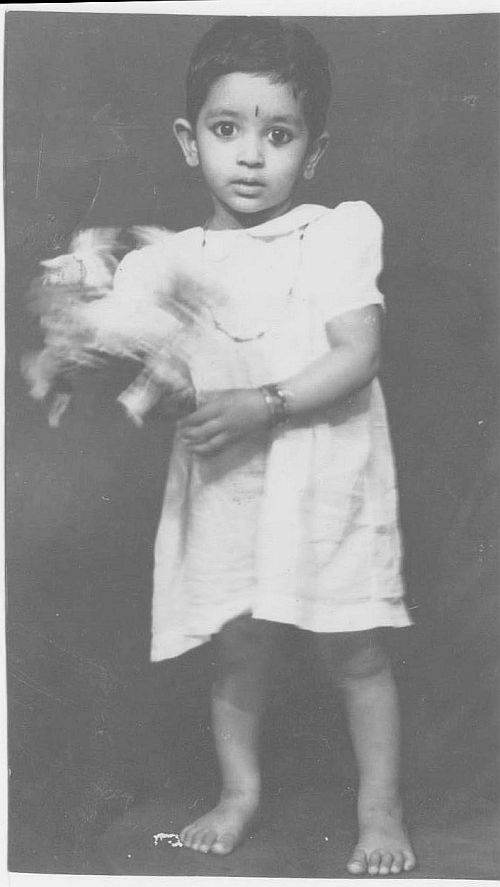
Visalam's daughter Savithri at Erode, age 1, 1944
But TVB alone took me and our two children to Ooty, arranging for a cottage in a hotel and an ayah for two months. No other officer did it. My brother took the opportunity to come and spend a few days in that hill station with us. (Visalam loved to recollect how she had the chance to see Jawaharlal Nehru with her beloved children, Savithri by her side and Ramesh in her arms-KB)
Similarly, TVB took us to be with him when he was working in Cochin-Ernakulam for a short period.
We moved to Bombay in 1948, August. Papu (Visalam's third daughter, Kamakshi, always known as "Papu" in the family circles-KB) was born there in November.
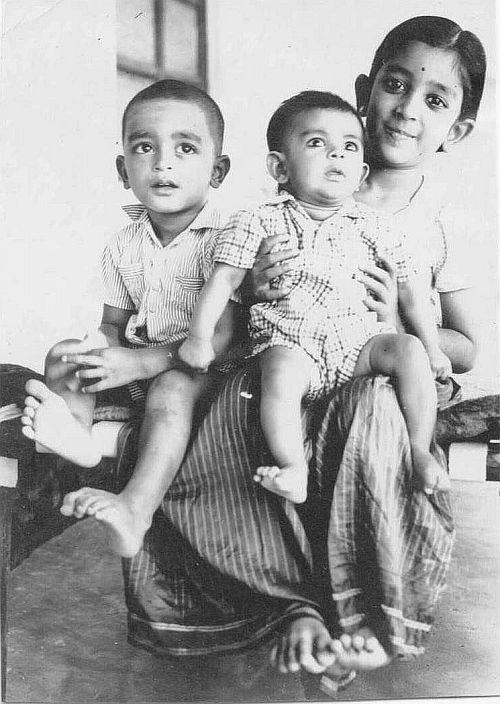
L to R: Visalam's three children: Ramesh, Kamakshi, Savithri 1948
The climate in Bombay did not suit TVB. He took a transfer to Jabalpur from there.
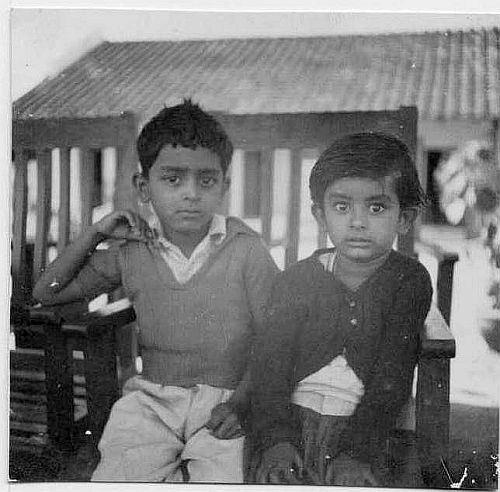
L to R: Visalam's children Ramesh and Kamakshi, Jabalpur 1951?
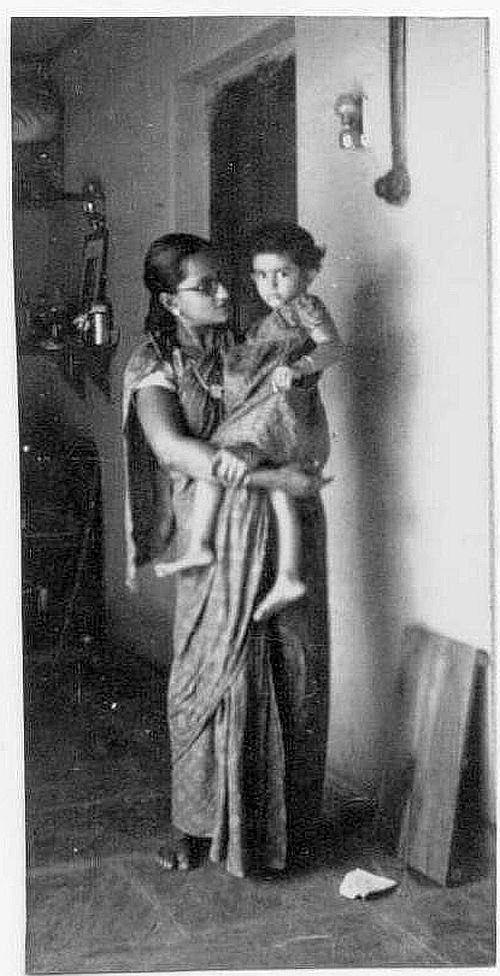
Visalam (L) with Kamakshi, Jabalpur, 1951
In the course of the eight or nine months that we were in Bombay, I had picked up a little spoken Hindi. (Incidentally, Visalam and her husband took Sanskrit lessons while in Jabalpur-KB). And before going to Jabalpur - which happened to be beginning of summer of 1949 - my father-in-law suggested that I go to Simla, where he and my mother-in-law would be for the duration of the hot months with Lalitha sithi and Venu athimber (Third sister-in-law and her husband\; this couple lived all their life in New Delhi - KB). Lalitha sithi's two sons were studying in a school at Sivaganga (with their aunt-KB) then, and they would also be in Simla during summer vacations.
It was a nice gathering. Both Venu athimber and Lalitha sithi were pleased to have us all with them. Their eldest daughter, Seetha, was very friendly and affectionate. Ramu was a very playful boy. Krishnan was quiet but just as smart as his brother. Sundari and Savithri were of the same age having been born two days apart. Ramesh, Bagi, and Papu were the little ones. Seenu was there working as cook. As he could be witty at all times the stay was nice.
Sithi actually told me more than once how happy she and her husband were to have all of us with them. Venu athimber taught the boys to play Bridge and other card games. Seetha, their firstborn, and I would be sitting in the outside verandah with our Punjabi neighbours all through the afternoon, knitting or doing some crochet laces while the boys played card games with their grandfather and the sons of our neighbour.
TVB went away to Jabalpur directly from Delhi, which we visited on our way to Simla from Bombay. At the end of the summer, I moved to Jabalpur, where our fourth child was born.
____________________________________________________
© Kamakshi Balasubramanian 2016
Editor's note: I approve all comments written by people\; the comments must be related to the story. The purpose of the approval process is to prevent unwanted comments, inserted by software robots, which have nothing to do with the story.
Add new comment